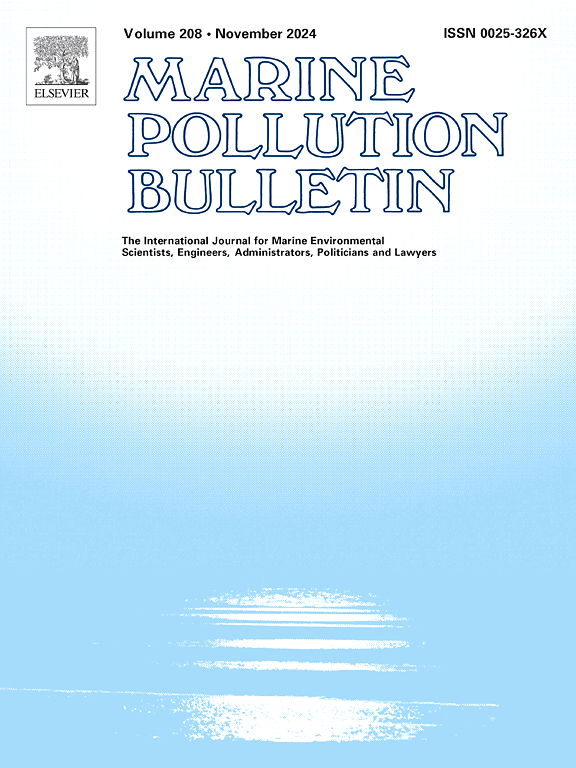利用多物种大小谱模型预估海洋变暖对中西太平洋中上层生态系统的影响
IF 4.9
3区 环境科学与生态学
Q1 ENVIRONMENTAL SCIENCES
引用次数: 0
摘要
海洋变暖可能改变中上层生态系统的食物网结构和物种相互作用,显著影响金枪鱼种群动态。然而,很少有研究从物种相互作用和生态系统的角度来评估这些影响。本文利用中国延绳钓渔业数据和公共数据建立了多物种尺寸谱模型(MSSM),评估了4种气候情景(SSP1-2.6、SSP2-4.5、SSP3-7.0、SSP5-8.5)下海洋变暖对中西太平洋生态系统的影响。我们的研究结果表明,海洋变暖将影响WCPO中金枪鱼、长嘴鱼和鲨鱼等大型远洋物种的自然死亡率、平均体重、生物量和产量。我们发现,海洋变暖对长嘴鱼和鲨鱼的生长和繁殖的影响比对金枪鱼的影响更大,其中短嘴鱼的生长能量率下降最严重,下降了5%。到2100年,SSP5-8.5和SSP1-2.6下的生殖能率分别为7.5%。预测结果表明,海洋变暖对某些鲨鱼物种的自然死亡率的影响大于其他物种。到21世纪末(2100年),与SSP1-2.6情景相比,SSP5-8.5情景下蓝鲨和大洋白鳍鲨的自然死亡率将增加8%。总体而言,海洋变暖将引起WCPO远洋生态系统结构的变化。这项研究为发展可持续的金枪鱼渔业和实施气候适应性管理战略以应对未来的气候变化提供了科学支持。本文章由计算机程序翻译,如有差异,请以英文原文为准。
Projected impacts of ocean warming on pelagic ecosystems in the Western and Central Pacific Ocean using a multi-species size-spectrum model
Ocean warming may alter food web structure and species interactions in pelagic ecosystems, significantly impacting tuna population dynamics. However, few studies have assessed those impacts from the perspective of species interaction and ecosystems. In this study, we developed a multi-species size-spectrum model (MSSM) incorporating Chinese longline fisheries data and public datasets to assess ocean warming effects on the Western and Central Pacific Ocean (WCPO) ecosystem under four climate scenarios (SSP1–2.6, SSP2–4.5, SSP3–7.0, SSP5–8.5). Our results demonstrate that ocean warming will affect natural mortality, mean body weight, and biomass and production of large pelagic species, including tunas, billfishes, and sharks in the WCPO. We found that ocean warming had greater impacts on billfishes and sharks growth and reproduction than on tunas, with Shortbill spearfish showing the most severe declines: >5 % in growth energy rates and > 7.5 % in reproduction energy rates under SSP5–8.5 versus SSP1–2.6 by 2100. The prediction results show that ocean warming has a greater impact on the natural mortality rate of some shark species than other species. By the end of the 21st century (2100), the natural mortality rate of Blue shark and Oceanic whitetip shark will increase by 8 % under the SSP5–8.5 scenario compared with the SSP1–2.6 scenario. Overall, ocean warming will cause changes in the structure of the WCPO pelagic ecosystem. The study offers scientific support for developing sustainable tuna fisheries and implementing climate-adaptive management strategies in response to future climate change.
求助全文
通过发布文献求助,成功后即可免费获取论文全文。
去求助
来源期刊

Marine pollution bulletin
环境科学-海洋与淡水生物学
CiteScore
10.20
自引率
15.50%
发文量
1077
审稿时长
68 days
期刊介绍:
Marine Pollution Bulletin is concerned with the rational use of maritime and marine resources in estuaries, the seas and oceans, as well as with documenting marine pollution and introducing new forms of measurement and analysis. A wide range of topics are discussed as news, comment, reviews and research reports, not only on effluent disposal and pollution control, but also on the management, economic aspects and protection of the marine environment in general.
 求助内容:
求助内容: 应助结果提醒方式:
应助结果提醒方式:


